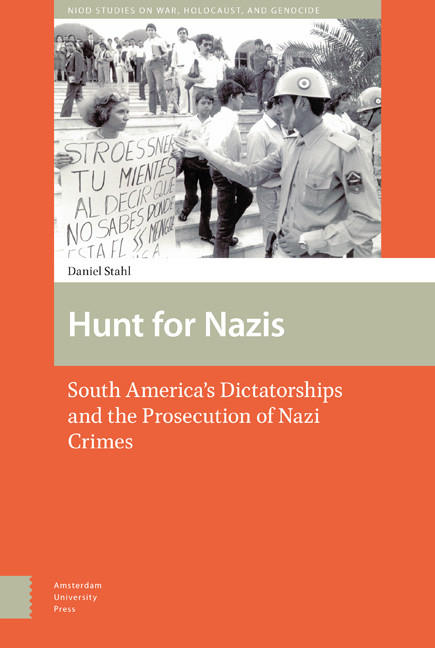Book contents
- Frontmatter
- Contents
- Preface to the English translation
- Introduction
- I The ‘Fourth Reich’
- II Reluctant Manhunt
- III Nazi Hunting as Political Opposition
- IV Two Ways of Dealing with State Atrocities
- Conclusion
- Acknowledgements
- The Most Important Manhunts and Extradition Proceedings
- Abbreviations
- Sources and Literature
- Index
- NIOD Studies on War, Holocaust, and Genocide
- Frontmatter
- Contents
- Preface to the English translation
- Introduction
- I The ‘Fourth Reich’
- II Reluctant Manhunt
- III Nazi Hunting as Political Opposition
- IV Two Ways of Dealing with State Atrocities
- Conclusion
- Acknowledgements
- The Most Important Manhunts and Extradition Proceedings
- Abbreviations
- Sources and Literature
- Index
- NIOD Studies on War, Holocaust, and Genocide
Summary
On 26 January 1983, Bolivian Interior Minister Mario Roncal contacted the German embassy on an urgent matter: Klaus Barbie, the former director of Security Policy and Security Service in Nazi-occupied Lyon, had been arrested for not paying some debts. Six months previous, the Federal Republic of Germany had requested his extradition. Barbie could now be turned over to German authorities the following day.
But if Roncal expected that he would make West German diplomats happy with this announcement, he was sorely mistaken. The week before, West Germany's Bolivian embassy had received clear instructions from Bonn that ‘appropriate’ steps should be taken to ensure that Barbie was extradited not to the Federal Republic, but to France, where he had been sentenced to death in absentia after the Second World War. West German judicial officials were worried that their own country's laws and jurisprudence would not guarantee a conviction, and they were concerned about international criticism should Barbie be acquitted. So instead of discussing how Barbie could be transferred to West German custody the following day, the deputy director of the West German embassy declared that he didn't have the necessary personnel at his disposal and asked whether the fugitive could not be extradited to France. Roncal responded that according to Bolivian law people could only be extradited to their country's neighbours or to their home countries. The West German embassy was given until the end of the month to state whether Barbie could be transferred to them. If not, Bolivia would try Barbie for ‘suspected drug offences and organizing paramilitary units’.
In the preceding months, various newspapers had reported that Barbie, who had fought the French Résistance during the Second World War, had supported the 1980 putsch of General Luis García Meza with a paramilitary unit of his own. In addition, Barbie had allegedly been involved in drug dealing under the subsequent military dictatorship, which had lasted until 1982. But it had taken a long time for Bolivia to pursue the crimes that had been committed under the Meza regime. Moreover, Bolivian prosecutors lacked hard evidence to prove the accusations against Barbie. All they had were newspaper reports.
- Type
- Chapter
- Information
- Hunt for NazisSouth America's Dictatorships and the Prosecution of Nazi Crimes, pp. 9 - 18Publisher: Amsterdam University PressPrint publication year: 2018



